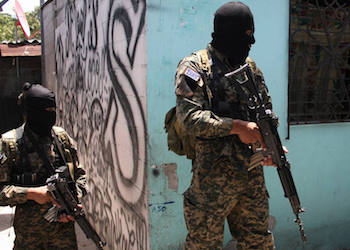El Salvador officials boast that the use of “extraordinary measures” has improved security in the country. But this rhetoric contrasts with the real situation on the streets and in the prisons, and defies repeated requests from the international community to change course.
On April 11, El Salvador Security Minister Mauricio Landaverde presented a report on the extraordinary security measures that have been in effect since 2016, claiming they were responsible for lowering homicide rates and improving authorities’ control over the prison system.
The controversial security plan includes mass arrests and the deployment of security forces and tanks on the streets. In the prisons, it limits inmates’ access to the outdoors and in some cases to their own attorneys.
The government claimed that overcrowding in the prison system had been nearly halved, and according to Landaverde, the extraordinary measures have enabled prison officials to “drastically reduce communication between imprisoned criminals and groups operating on the outside.”
Landaverde also credited the extraordinary measures for a 40 percent drop in the national homicide rate since 2015, the most violent year in El Salvador’s recent history. However, the minister did not offer a comparison with homicide rate from 2016, when the extraordinary measures were implemented.
InSight Crime Analysis
The triumphant rhetoric from the Salvadoran government on its questionable security plan contrasts with the reality of continued violence in the country, and it rebuffs calls from the international community to lift the controversial extraordinary measures.
The alleged reduction in homicide rates to which Landaverde referred is more the result of conveniently chosen dates and figures than the measures implemented in 2016.
In fact, in the middle of last year, El Salvador experienced a spike in violent deaths. And in the beginning of 2018, the national police reported a 14 percent increase in the country’s homicide rate compared to the same time period during the previous year, which the government attributed to an alleged MS13 purge.
SEE ALSO: Coverage of Security Policy
Despite calls to not to renew the extraordinary measures from the Inter-American Commission on Human Rights (IACHR) and United Nations Special Rapporteur on Extrajudicial Executions Agnes Callamard, the Salvadoran congress recently approved a six-month extension of the plan in an almost unanimous vote, with 64 in favor, one against and three abstaining.
In an interview with InSight Crime, Callamard — who had previously characterized the measures as “illegal” — expressed concern regarding human rights violations committed in El Salvador.
“It is one of those countries that are battling unconventional violence and using possible excessive force in their responses,” the UN official said.
The credibility of the argument that the extraordinary measures have reduced communication among gang leaders was called into question by a recent report by La Prensa Gráfica examining a January 2016 meeting among MS13 gang members in which they planned to attempt a second truce with the Salvadoran government. According to the Attorney General’s Office, the truce never materialized due to the vote months later to extend the extraordinary measures.
The confusing way in which the government has decided to interpret and present violent crime statistics could be an attempt by the administration of President Salvador Sánchez Cerén to improve public opinion of its poor security record in preparation for next year’s presidential elections.

